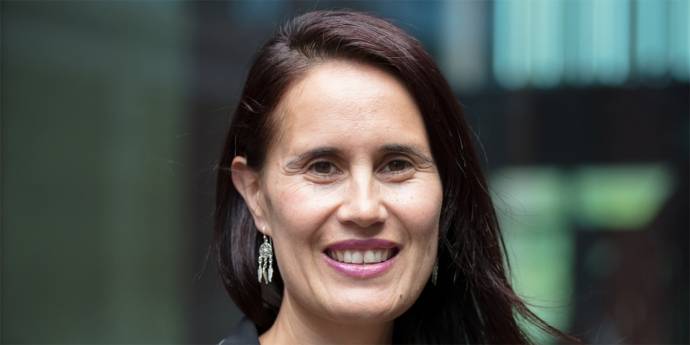Kiriwaitingi Rei-Russell: Guided by the past to walk towards the future
Kiriwaitingi Rei-Russell was reluctant to join her first board but hasn't looked back. She's among a new group of young Māori changemakers.
Māori women and younger voices are few and far between around board tables. Laurissa Cooney is committed to blaze that trail for others to follow.

The proud mother of four was the Institute of Directors’ Emerging Director recipient for the Bay of Plenty Branch in 2017. For Laurissa, being clear about her values is paramount as a director. She shares with us her views on governance, her passions, and what she enjoys most about being a member of IoD.
Ko Laurissa Cooney toku ingoa
No Ati Hau-nui-a-Pāpārangi ahau
I am the blessed mother of four wonderful children. I am a Chartered Accountant and the Chief Financial Officer for Te Whare Wānanga o Awanuiārangi in Whakatane. Prior to this role, I was a Senior Manager in the Audit & Risk department for Deloitte in both Auckland and London offices. Recently, I completed certification as a leadership coach.
I’m an Independent Director on the Audit & Risk Committee of Ngā Tāngata Tiaki Trust, a post-treaty settlement entity in Whanganui. We were involved in the work which resulted in the Crown’s recognition of the Whanganui River as a legal entity. I’m also an Independent Director on the Audit & Risk Committee of Te Ātihau Whanganui Incorporation, a Māori-owned farming company based at the foothills of Matua te Mana, Mt Ruapehu. Its purpose is “to rejuvenate the land for our people and reconnect them to their land and customs”.
I’m a Director for the Tourism Bay of Plenty Board, a council-controlled trust which aims to promote Bay of Plenty to the world. And more recently, I was appointed Director of Ngāi Tai ki Tāmaki, a post-treaty settlement entity based in Auckland. Following its Treaty Settlement in July 2018, the trust is entering a new era in its history.
The ability to take both a holistic, strategic view, coupled with the skill to deep-dive into the detail when required and knowing when to seek further information or expertise. And on governance issues, directors need to understand what is beneath the iceberg/surface to keep the organisation safe as it achieves its strategic goals. It is also important to be ready to learn and keep abreast of the evolving range of issues directors face.
To be the best version of a director I can be - to be clear on what my values (Nga Uara) are as a director. I strive to live by these each time I sit at a board table and assume my role as a director.
I am driven by a deep desire to influence society positively. In governance I can do this across a range of organisations. Also, Māori women and younger voices are few and far between around board tables. I am committed to be that initial person who others can relate to and see themselves in so they can be motivated to step into the space.
Looking after my wairua (spiritual) wellbeing. Examples of this include karakia/meditation, gratitude and forgiveness practice, walks on the beach, drinking quality water, reading and focussing on my wairua connection. I also strive to mentally incorporate energy awareness into my everyday life through my thoughts, language, actions, and my connection with consciousness. This helps ensure I get enough quality sleep for a start. I can reset daily and my cup is filled with just what I need.
The cutting-edge professional development support, members’ forums, the annual conference and the talented, interesting people you meet.
The Company Directors Course and annual IoD Leadership Conference. I love that the speakers and topics are relevant and current. I think these two are the best way to prepare a director for today’s governance challenges and opportunities.
My whānau! I’m also currently studying towards a professional doctorate, researching how wairua and energy awareness and practice, healing and evolving consciousness apply in the leadership and governance space. There was a time in the past it was almost taboo to talk about spirituality in a business context, and perhaps it still is in some areas. For me, especially as a Māori leader, it’s essential to see spirituality entwined in everything, and to bring these values strongly into the leadership arena.
The whakatauki (saying) from my iwi, Te Ati Haunui-a-Pāpārangi sums up my source of inspiration:
“Ko au te awa, ko te awa ko au.” Translation: “I am the river and the river is me.”
For me, this means we are one and are connected through the wairua; that the health and wellbeing of our people are a direct reflection of our environment and vice versa. Hence I am motivated to share and honour this ancient wisdom to raise awareness for the betterment of our society.